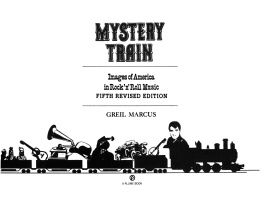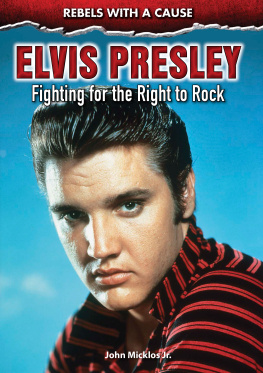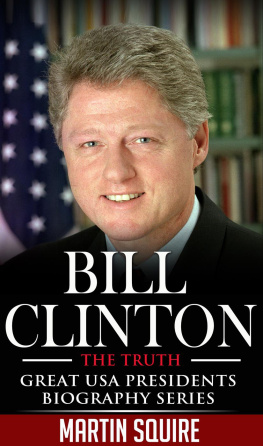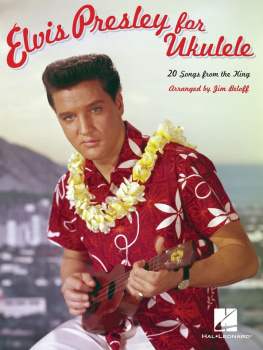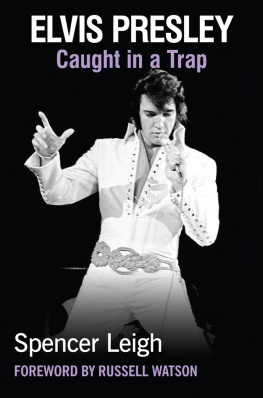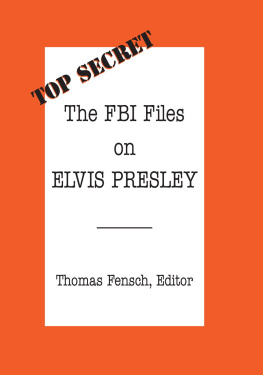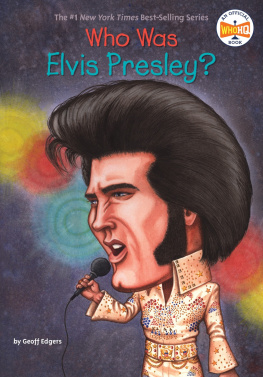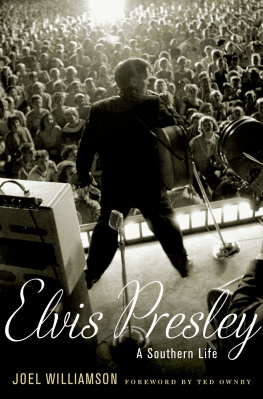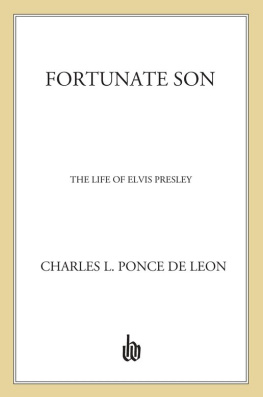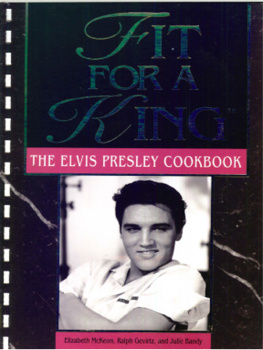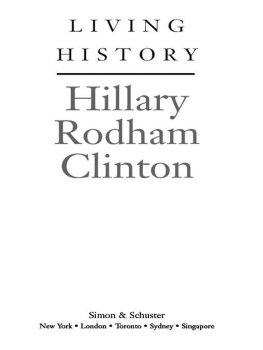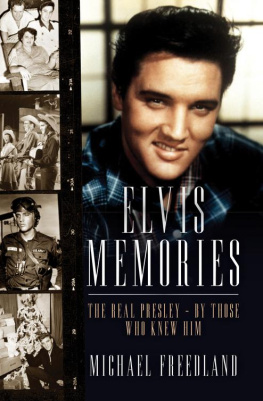The author and publisher have provided this e-book to you for your personal use only. You may not make this e-book publicly available in any way. Copyright infringement is against the law. If you believe the copy of this e-book you are reading infringes on the authors copyright, please notify the publisher at: us.macmillanusa.com/piracy.
You laughed at me walkin, baby
But I have no place to go
Bad luck and trouble have taken me
I have no money to show
Otis Rush, Double Trouble, 1958
Every time I think that I have finally got it made
Some losing cards are played
Just cant make the grade
I got
Double trouble
I got
Double trouble
I got
Double trouble
Twice as much as anybody else oh yeah
Elvis Presley, Double Trouble, 1967
Katie Couric: The entertainer of the century?
Bill Clinton: For me in my lifetime the early Elvis
would be the best.
Katie Couric: Your favorite Elvis song?
Bill Clinton: I Want You I Need You I Love You.
Today, NBC, December 20, 1999
He was an accident waiting to happen
Most accidents happen at home
Warren Zevon on Elvis Presley,
Porcelain Monkey, 2000
Now the stage is nearly bare, but hes still standing there headline to story on Bill Clintons last year in office,
New York Times, January 19, 2000
I rooted for him during the impeachment process, of course, because fanaticism and puritanism in any form are my enemies, movie director Oliver Stone said in April 1999, two months after President Bill Clintons acquittal by the Senate on charges of perjury and obstruction of justice. At issue was Clintons testimony regarding an affair with a White House intern, originally given during a deposition in a later-dismissed sexual harassment case brought by one Paula Jones, a secretary employed by the State of Arkansas during Clintons time as its governor; now, after more than a year of leaked and manipulated testimony meant to drive Clinton from office through extralegal means, Independent Counsel Kenneth Starr had lost the formal battle, and the crusade on the part of Republicans in the House of Representatives to expel Clinton from Washington had destroyed not their chosen enemy but two of their own leaders. Not that the victory ennobled the victor, Stone said:He reminds me so much of Nixon. The pathology. The need to lie. A President who says, I smoked but I didnt inhale. A President who refuses to be proud of, or even to acknowledge that he didnt go to Vietnam for reasons of principle, and makes it sound like hes running away from what he did. Total pandering to the right wing. Clinton and the teenager. Like an Elvis movie. The poor man couldnt even get laid well.
A month later, in an interview with journalist Jack Newfield, New York Times columnist Frank Rich was trying to make ordinary sense of the same bizarre series of events and found himself speaking the same languagea language in which a metaphor that at first seems transparent is almost immediately opaque. Do you think the far right hates Clinton more for cultural than for political reasons? Newfield asked. Do they just see him as the avatar of the 1960s with sex, drugs, and rock n roll? Yes, Rich said, as if nothing could be simpler. Not that he wanted anyone identifying him or his generation with Clinton anymore than Stone did, just because they were all about the same age: In some ways its absurd because many people who still believe in the Left of the 1960s would find Clinton a very poor example of it. Rich recited the litany: He wasnt really a serious Vietnam war protester; he was an opportunist even then. We know he smoked marijuana, but hes hardly an exemplar of the Ken Kesey LSD generation. Even his taste in Sixties music, I would say, is extremely suspect Its kind of preposterous. Its like if you hated Elvis Presley, choosing Dick Clark as the person to focus on. Im not a Clinton fan, but hes just not worthy of the kind of hatred that everyone has for him.
Why are these two interesting people drawn so helplessly to the identification of Bill Clinton with Elvis Presley? Trying to pull a usable metaphor out of the air, why are they drawn to that identification so imaginatively? The idea of Clintons presidency as an Elvis movie (presumably the 1967 Double Trouble, where nightclub singer Guy Lambert is pursued both by a smitten seventeen-year-old heiress and a calculating woman his own age) is almost irresistible. The idea of Bill Clinton as Dick Clark creates an archetype that could rewrite Constance Rourkes unsurpassed 1931 classic American Humor: A Study of the National Character. But the momentum in the identification of Elvis and Clinton isnt about ideaswhy are Stone, who as a Hollywood moviemaker can get more women than the president, and Rich, who during the year ofimpeachment came perhaps too close to crossing his newspapers line of tolerance of Bill Clinton, drawn to this identification so personally? In the moment in the conversation when Elvis arriveslike Superman or a bad conscienceto dramatize or mystify what is otherwise a string of unexamined assumptions meant mostly to establish that the speaker is better than Bill Clinton, one can glimpse a piece of each speakers life story: his attempt, in the 1950s or 1960s, to define himself by and against Elvis Presley, and how uncertain each is about how the story may have turned out. They are almost saying: What if Bill Clinton is Elvis Presleys true inheritor?
Gallery owner to Jesse: You think you can waltz in here in your cheap shoes and pass yourself off as an art critic?
Jesse: I want you to know that these shoes were not cheap! They cost fifty bucks! And what about your shoes? You look like you mugged Elvis!
Diego, artist with Jesse, attempting to ingratiate himself
with gallery owner: The early, cool Elvis
Jesse, NBC, November 5, 1998
Like Jesse and Diego, Oliver Stone and Frank Rich are playing with the Good Elvis and the Bad Elvis. Their Clinton is opposed to the Real, Good Elvis; hes the Bad Elvis, or the Fake Elvisbut somehow the equations dont hold. Apparently simple, the equations are in fact complex; seemingly fixed in cliche, they are unstable. Both Elvis and Clinton are alive in the common imagination as blessed, tawdry actors in a pretentious musical comedy cum dinner-theater Greek tragedy about their countrys most unresolved notions of what it means to be good, true, and beautifuland evil, false, and ugly. Americans are caught between the truth and falsity of performance (or art) (or culture) or of art (or politics) ( or culture), caught along with the countless people all over theworld whose response to the likes of Elvis Presley has made them, in Leslie Fiedlers phrase, imaginary Americanspeople like Boris Yeltsin (who in 1991, after standing on a tank in Moscow to rally democratic forces against a fascist coup, returned alone to his office to listen to Elvis sing Are You Lonesome Tonight?, to hear him say, You know someone said, the worlds a stage, and each must play a part ), Sinad OConnor (who, having named Bill Clinton the sexiest man in the universe in late 1998, then wrote the Irish Times asking, Does impeachment mean theyre going to turn him into a peach? If so, can I eat him?), or Salman Rushdie (who in 1999 insisted on both Presley and Clinton as familiars: Elviss music, heard in India in 1956, didnt seem foreign, he said, and he spoke with pride of the reply Clinton sent him when Rushdie wrote offering his support: Bill Clinton, cest moi!). We are as attracted to the falsity as to the truthboth because we are never sure which is which (The early, fake Elviswhat if the later, helpless Elvis was the real person?), and because truth is final. Thats its satisfaction and its alienation. Falsity is open: its future is always unfixed.


